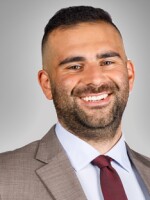ALLENTOWN, Pa. - St. Luke's University Health Network held a presentation Tuesday at its Sacred Heart location, aiming to shine a light on the seriousness of the child care situation in the Lehigh Valley.
Child care workers, advocates, medical professionals and an economist presented warnings about what they all agree is a "child care workforce crisis."
Child care workers in the room appeared especially passionate about one specific point: they do not feel valued the same way K-12 teachers are.
- Representatives from different parts of the child care sector sounded the alarm on what they are calling a staffing crisis
- Child care workers said they are under-appreciated, underpaid and overworked
- Advocates and day care centers say they need more government funding, as well as a change in the level of respect child care workers are given
According to statistics presented by the Allentown School District, the usual starting salary of a K-12 teacher in the area is $52,000 — compared to what child care workers make: $28,000 to $32,000 as indicated by the Sacred Heart Education Committee.
"Our biggest competitor [for employment] is the Wawa across the street," said Shandel Sedgwick, a lead Pre-K teacher at the YMCA in Allentown. "They get full benefits there."
Sedgwick said at her day care, child care staff only get dental and vision benefits, without any other general health care.
Scope of the problem
On top of the low pay and benefits, Sedgwick said the working conditions have been tough. She alluded to a generation of children who are having trouble behaving and communicating, partially due to pandemic stresses and restrictions, where they have spent the last few years of their childhoods.
Citing numbers from Start Strong PA, a group that advocates for increased access to and affordability of high-quality child care programs, the presentation's slideshow stated there are currently 7,000 vacant child care jobs in the state, almost 150 closed day cares, and 2,688 children not getting child care because of the staff shortage.
Crystal Messer, Vice President of Childcare at the Greater Valley YMCA, said state funding is one of the greatest solutions to the crisis, but it's sometimes cut.
Messer also explained a ripple effect, where child care issues cause problems for the parents of kids, who can miss out on other things, like work, if they can't find suitable care for their kids.
"The loss of these child care programs at such a significant rate is burdening our economy, with no end in sight," she said.

"We need funding. We <i>need </i>funding. We've got to figure out this business model."Frank Ford, president of St. Luke's Sacred Heart Campus
St. Luke's Sacred Heart Campus President Frank Ford wrapped up the presentation with calls to action.
"We need funding. We need funding. We've got to figure out this business model," he said. "And we also need good common sense, consistent policy relative to this major problem. It's not going to be solved by the private sector."
Standing up
During the presentation, one of the speakers, Shelly Feller with Unconditional Child Care, spoke to the room.
“There are a few child care workers in the room right now, would they please stand up so we can thank you," she said.
A few seconds passed, and nobody stood up.
Most of the roughly 40 attendees craned their necks back, looking for them, appearing to wonder what was going on. A few confused facial expressions were visible.
Feller, who apparently knew for a fact there were some child care workers in the audience, repeated the question. “Come on, don’t be shy,” she said.
Then, after one stood up, the rest of them did too: about seven. The room let out hearty applause, and the child care workers stood and smiled, nodding, before quickly sitting down.
After the presentation, when asked why this happened in such a peculiar way, Sedgwick offered the following explanation.
“Nobody really wanted to stand up,” she said. “Probably because – like they were saying in the presentation – we’re not very, you know, valued in the workforce. So when you’re in an environment like this, where we’re around a lot of business officials, I feel like it has a bit of a negative connotation, especially in the media.”
Sedgwick added that she believes it’s important for people to remember people like her and her colleagues are doing the “dirty work,” and that if they didn’t go to work, it would be hard for others who depend on childcare to go to work as well.


